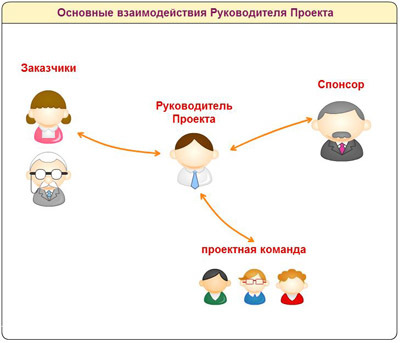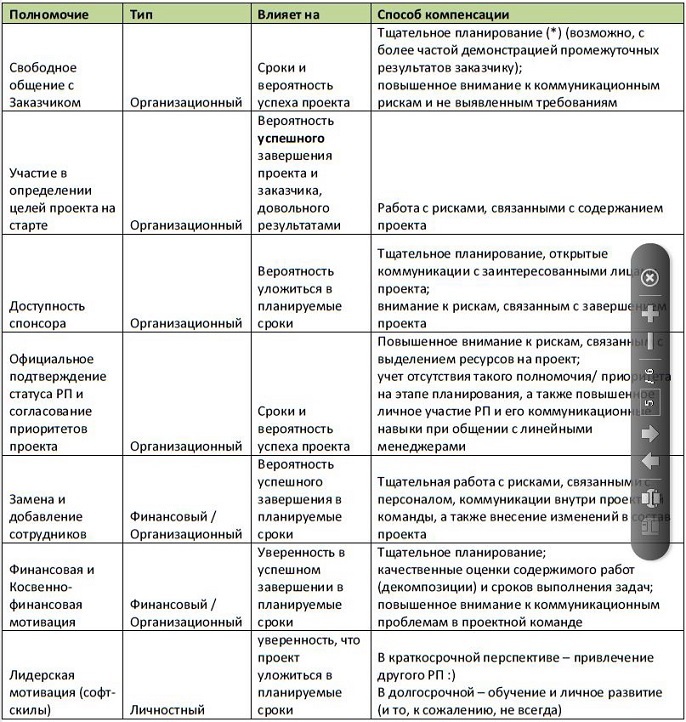Project Manager Powers
"According to others, the Project Manager is the person who, with the help of nine women, can have a baby in one month" - quote from the Internet
Often there is a situation when the project manager is required to successfully complete the project without providing sufficient authority to achieve the goal.
The other day I got involved in a theoretical dispute on the topic of what powers the project manager (RP) needs to successfully complete the project. Or, more precisely, in the wording, what powers should be granted to the RP in the draft, so that there is no excuse for “their shortage” in case of unsuccessful completion.

Below I present my thoughts, how I see the situation in theory, and how it is most often encountered in my practice.
Terminology
First you need to decide on the key terminology. I propose to use the terminology from the PMBOK manual.
The sponsor is the individual (or group of individuals) who provides resources and support for the project and is responsible for achieving success. Sets the priority of the project in the organization; provides resources; approves the priority level of resources. I want to note that, despite the fact that in Russian the word sponsor is associated primarily with money, and that funding is very important for the project, the sponsor also has other equally important responsibilities.
Customers - persons or organizations that will approve a product, service
or the result of the project, and manage them. Form requirements for project results, accept and approve end results.
Project team - the rest of the team members who perform the work on the project.
A successful project is a project that fits into the project triangle (time, cost, content), if there is a customer satisfied with the results.

During the project, the main interactions of the RP occur with the Customer, the Sponsor and the Project team (not to be confused with the communication channels on the project, which are much more). From this point of view, I will consider the required authority for the successful completion of the project.
Theory of powers of the RP (ideal project in the ideal company)
I see the following picture of the manager’s ideal powers:
Communication authority
Free communication with the customer
RP should have the possibility of direct communication with the Customer. The presence of such powers greatly simplifies the process of interaction, meetings and escalations.
Sponsor availability
The RP must be able to regularly communicate with the sponsor to report on the current status of the project, and, if necessary, to escalate and solve problems that fall outside the scope of the RP.
Also, it is often necessary to resort to the help of the Sponsor in part of the project closure . For example, to get the latest signature on the closing acts (quite often this is a purely political activity, and, unfortunately, in Russian realities it is not always dependent on the RP).
Organizational authority
RP participation in the project initiation phase
The coordination of the project objectives during its initiation / start gives the opportunity to formulate, fix and coordinate the project objectives with all interested parties (with the Customer, Sponsor and the project team) at the start of the project.
The Project Management Institute (PMI, http://www.pmi.org ) insists, and I fully support this position so that the RP is involved in the project as early as possible (initiation phase). Ideally, before concluding a contract, in order to be able to assess the realism of the project triangle promised to the customer (time, functionality, budget).
The earlier the RP connects to the project management organization, the more opportunities it has for forming a unified perception of the goals and objectives of the project by all participants.
Official confirmation of the status of the RP
You need official permission (for example, in the project charter) to attract resources to the project. And, most importantly, the Sponsor is required to formalize the project priorities within the organization or project portfolio so that line managers (in the matrix structure) do not allocate resources to complete the project’s tasks according to the residual principle, justifying this with more important / urgent projects.
Credentials associated with the team
One of the key moments of the successful completion of the project is the formation of an effective team. This requires:
Adding and replacing people on the project.
If an employee does not fit into the project team for any parameters, then the PM should have the opportunity to replace the employee or withdraw him from the project. Yes, I understand that you need to be able to work with those who are, but sometimes it is more effective to replace an employee than to spend time on him, both in the long and short term.
In the same paragraph, I attribute the possibility of adding people to the project . That is, if the RP can justify (in the project planning phase, in the event of a change in the project triangle, or in the case of risk triggering) why more people are needed, they will be allocated to the project. The key phrase is “if the RP can justify,” as not always adding new people shortens the time frame or increases productivity. In addition, there are not always “extra people” in the company, but why not try :)
The ability to motivate people:
Motivation requiring the allocation of financial resources, which, in turn, is divided into:
Financial motivation - bonuses, overtime / weekends, bonuses ...
Indirect financial motivation is team building, training, providing more comfortable working conditions (i.e., having a budget for coffee makers, comfortable tables / chairs, productive computers), co-location of employees (collocation). In Russia, the term "non-financial motivation" is used, although it seems to me a more appropriate term - "indirect financial motivation", since all this requires the financial costs of the company one way or another.
Leadership motivation . The presence of the very "soft skills" of the project manager about whom they like to talk at various trainings - communication and management skills (the ability to persuade, motivate, manage, find the right approach to people, and resolve conflict situations). That is, the inherent skills of a good leader, which are used constantly.
Practice (as it happens in real life):
All of the above relates to the maximum desired authority, and for each item I can say that I have never had this in my project activities. Not that this was the reason for the failure of the project, but additional difficulties arose.
My firm belief is that in organizations providing all the above powers in 100% of the volume, the project can be completed without the participation of the PM. Scrum master or yesterday's lead team will cope with the task. Perhaps with difficulties, with a delay of terms or inefficient use of resources, but the project is drawn out.
')
Unfortunately, or fortunately for the RP, in reality such organizations do not exist. In any case, I did not have to hear about such.
The question arises, what is really the minimum necessary for the RP to successfully complete the project.
All of the above points can be divided into three types:
- Financial - which require financial investments
- Organizational - which are governed by the rules of the company
- Personal - which require the use of personal skills RP
In the table below, I present my vision of the division of the listed powers into types, and also what, first of all, is affected by the absence of these powers. In the last column I indicated how, from my point of view, it is possible to compensate for their absence.

(*) - Here it should be read as “More careful planning” - crooked, but in fact - since the RP must plan carefully, and in this case still “more carefully”.
It is worth noting that “compensation” does not mean full replacement. The project may be such that without a sponsor and his personal connections not to sign the act (we work in the conditions of Russian realities) - everything depends on the specifics of the project or project area.
On the other hand, the need to compensate for the lack of authority potentially imposes additional work on the PM. And there may not be enough time in days to compensate for the absence of two or three powers.
Thus it can be said that
- there is an ideal list of powers
- there are options "how to get out", in the absence of a particular authority
- to fully compensate for something missing is impossible
- There is no universal list of mandatory authorities for any project, due to the specifics of each project.
- The personal qualities of the RP significantly help in the successful completion of the project.
Let me explain the last thought in more detail.
It can be noted that the RP has the ability, in the main, to influence organizational powers. Personal powers (soft skills) are either there or not, and it is unlikely to have time to develop them during the project. On the other hand, if they exist, nobody can take them away or “forbid” them to use them on the project.
With financing it is also very difficult to change something. There is a certain budget planned for a project, and it is extremely rare to be able to increase it with a constant amount of work.
Quite often, it is possible to successfully resolve the issue of the lack of any authority through the personal qualities of the RP. For example, agree with the sponsor on the allocation of 15 minutes a week, even if the company with respect to such communication "is not accepted."
My practice fully confirms this conclusion. He repeatedly observed that the more successful (in terms of project success) managers are those who walk and demand, persuade, and solicit, standing above the soul. Who agrees with the line managers about people (he brought a box of beer from Prague in exchange for the participation of a strong analyst on my project).
Who manages to persuade the supply manager to more comfortable tables / chairs, headsets and telephones ...
Who solicits the best working conditions from managers, material and non-material incentives to employees.
Who catches and communicates with the sponsor about the status and problems of the project (including interception of the sponsor from the elevator, to tell about the urgent, and connect to solving problems).
Who keeps the customer informed (even despite the resistance from the customer), connects him to the discussion and solution of problems. Ensures that everyone (customer, team, users) has a common understanding of the goals and status of the project ...
In general, I want to emphasize the idea that the very pro-activity that we, project managers, love to see with our employees, is very useful to include in ourselves. At a minimum, this is useful for project success.
Respectfully,
Oleg Ponomarev, PMP
Source: https://habr.com/ru/post/300062/
All Articles